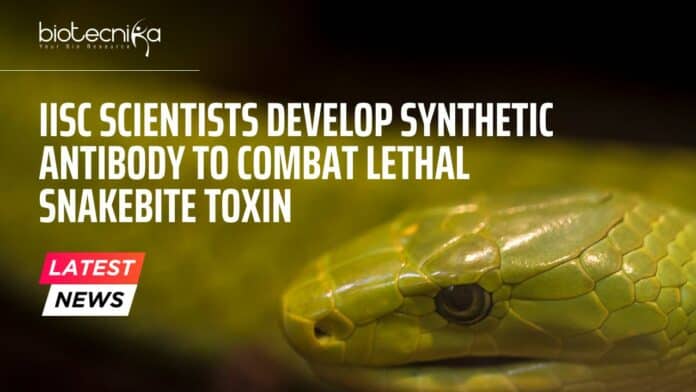IISc Scientists Develop Synthetic Antibody to Combat Lethal Snakebite Toxin
Researchers at the Indian Institute of Science (IISc) have made a groundbreaking discovery by creating a synthetic human antibody that can effectively neutralize a potent neurotoxin produced by the Elapidae family of highly toxic snakes such as the cobra, king cobra, krait, and black mamba. This breakthrough holds the promise of providing broad protection against various snake venoms, thereby offering a potential solution to the thousands of deaths caused by snake bites each year, especially in regions like India and sub-Saharan Africa.
The Need for Innovative Solutions
Current methods for developing antivenoms involve injecting snake venom into animals like horses to harvest antibodies from their blood. However, this traditional approach has limitations as these animals can be exposed to various bacteria and viruses over their lifetime, leading to the presence of unnecessary antibodies in the antivenoms. In fact, less than 10% of a typical antivenom vial contains antibodies specifically targeted at snake venom toxins.
Innovative Approach to Antibody Development
The team at IISc’s Scripps Research Institute and the Evolutionary Venomics Lab (EVL) at the Centre for Ecological Sciences (CES) took a fresh approach by leveraging techniques previously used to screen
antibodies against diseases like HIV and COVID-19 to develop a new synthetic antibody capable of neutralizing snake venom toxins. By targeting a conserved region within the core of a major toxin found in Elapidae venom known as the three-finger toxin (3FTx), the researchers were able to design a synthetic antibody that showed promising results in binding to and neutralizing venom toxins from various elapid snakes worldwide.Efficacy of the Synthetic Antibody
Animal studies conducted by the researchers demonstrated the efficacy of the synthetic antibody in neutralizing toxins from snakes such as the monocled cobra and black mamba, surpassing the potency of conventional antivenoms by nearly 15 times. Of particular significance was the ability of the synthetic antibody to continue offering protection even when administered with a time delay, unlike traditional antivenoms that lose effectiveness with delayed administration.
Future Prospects and Clinical Trials
Looking ahead, the researchers envision expanding their approach to develop antibodies against a broader range of snake venoms, with the goal of creating a universal antivenom therapy that can combat the venoms of various snake species globally. While more research is needed before the synthetic antibody can be widely used in clinical settings, the team is optimistic about the potential of their innovative solution to transform snakebite treatment and save lives without the need for animal-based venom production.
Keywords: Synthetic Antibody to Combat Snakebite Toxin by IISc Scientists, IISc, scientists, synthetic antibody, snakebite toxin, Elapidae family, cobra, krait, black mamba, antivenom, antibodies, venom toxins, three-finger toxin, research, breakthrough, innovative, clinical trials.






























